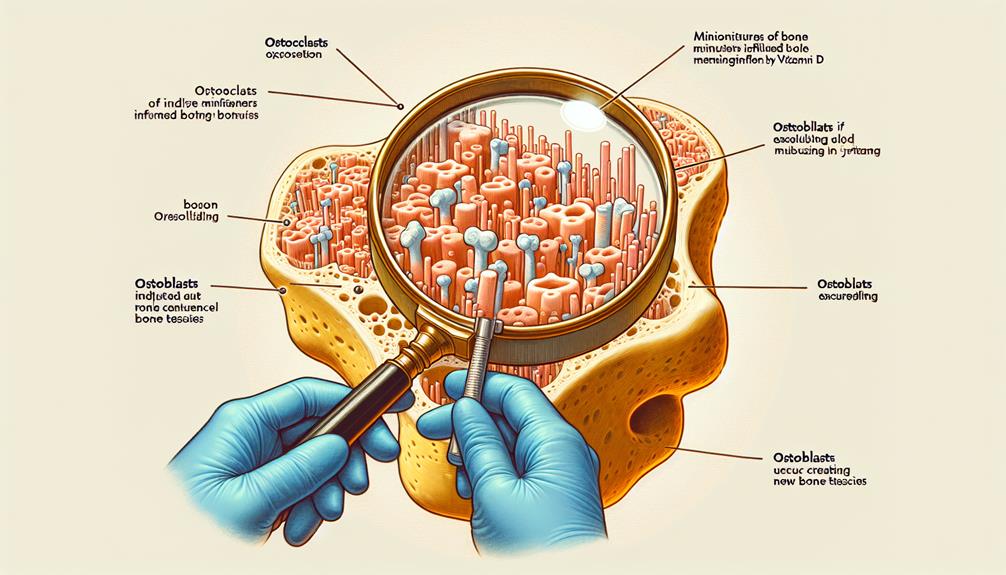







Understanding how Vitamin D impacts your bone health is essential. Vitamin D plays a critical role in bone mineralization and calcium absorption, preventing bone disorders. It facilitates calcium absorption, essential for bone development, density, and supports osteoblast activity promoting bone strength and repair. Additionally, Vitamin D regulates calcium homeostasis, controlling blood calcium levels. To guarantee strong bones, include sources like fish, egg yolks, and supplements if needed. Consulting a healthcare provider can determine your requirements. Adequate levels are critical, with sunlight exposure and diet balance being key. Maintaining ideal Vitamin D levels is crucial for lifelong bone health.
Key Takeaways
- Vitamin D enhances calcium absorption essential for bone mineralization.
- It supports bone development, density, and strength.
- Regulates calcium homeostasis, impacting bone health.
- Promotes osteoblast activity crucial for bone formation.
- Adequate levels through diet/supplementation are vital for strong bones.
Importance of Vitamin D for Bones
Understanding how vitamin D impacts bone health is essential for maintaining strong and healthy bones throughout life. Vitamin D plays a vital role in bone mineralization, which is the process by which minerals such as calcium and phosphorus are deposited in the bone matrix, contributing to bone strength and density. Adequate levels of vitamin D are necessary for ideal bone health, as it helps the body absorb calcium, a key mineral for bone strength.
Vitamin D supplementation is often recommended for individuals who have low levels of this vitamin, as it can help prevent conditions like osteomalacia or rickets, which weaken bones and lead to fractures. Without enough vitamin D, the body struggles to absorb calcium efficiently, which can result in brittle bones prone to fractures. Ensuring you have sufficient vitamin D levels through supplementation or exposure to sunlight is crucial for maintaining healthy bones and reducing the risk of bone-related disorders.
Role of Vitamin D in Calcium Absorption
Vitamin D plays a vital role in facilitating the absorption of calcium in your body, essential for maintaining strong and healthy bones. When your skin is exposed to sunlight, it produces vitamin D. This sunlight exposure is crucial for ensuring an adequate amount of vitamin D in your body, which in turn helps with calcium absorption. In addition to sunlight, dietary sources such as fatty fish, fortified dairy products, and egg yolks are essential for obtaining vitamin D.
Calcium absorption is a critical process for bone health. Without sufficient vitamin D to aid in this absorption, your body may struggle to utilize the calcium you consume, leading to weakened bones and an increased risk of fractures. During bone development, especially in childhood and adolescence, the role of vitamin D in calcium absorption becomes even more crucial. Ensuring you have enough vitamin D through sunlight exposure and dietary sources is key to supporting optimal bone health and strength throughout your life.
Vitamin Ds Impact on Bone Density

Bone density can be greatly influenced by the levels of vitamin D in your body. Vitamin D plays an essential role in bone development and maintenance. Adequate vitamin D levels help in the absorption of calcium and phosphorus, essential minerals for bone strength. When your body lacks vitamin D, it can lead to decreased calcium absorption, affecting bone mineralization and density. This deficiency can increase the risk of conditions like osteoporosis, where bones become weak and brittle.
To maintain excellent bone density, it is important to make sure you are getting enough vitamin D through sources like sunlight exposure, fortified foods, and supplements. A balanced diet rich in nutrients, including vitamin D, is crucial for overall bone health. Regular physical activity also supports bone strength and density. By prioritizing nutrition and incorporating vitamin D into your daily routine, you can positively impact your bone density and reduce the risk of bone-related issues.
Regulation of Calcium Homeostasis by Vitamin D
In the complex regulation of calcium homeostasis within the body, vitamin D plays a crucial role. Vitamin D helps in maintaining proper calcium levels through its actions on kidney function and hormonal regulation. In the kidneys, vitamin D boosts the absorption of calcium from the diet. It facilitates the production of a hormone called calcitriol, the active form of vitamin D, which stimulates the intestines to absorb more calcium. Additionally, vitamin D helps control the levels of calcium and phosphate in the blood by influencing the kidneys to reabsorb calcium that would otherwise be excreted in the urine.
Furthermore, vitamin D interacts with parathyroid hormone (PTH) to finely adjust calcium balance in the body. When calcium levels are low, PTH is released to stimulate the activation of vitamin D, which in turn increases calcium absorption in the intestines and prevents calcium loss through the kidneys. This intricate interplay between vitamin D, kidney function, and hormonal regulation ensures that adequate levels of calcium are maintained for essential bodily functions.
Vitamin Ds Influence on Osteoblast Activity

Enhancing osteoblast activity, vitamin D plays a vital role in promoting bone formation and strength. Osteoblasts are responsible for bone formation by producing the matrix that eventually mineralizes to form new bone tissue. Vitamin D influences osteoblast function by binding to specific receptors on these cells, which in turn stimulates the synthesis of proteins involved in bone formation. Additionally, vitamin D plays a key role in regulating calcium and phosphate metabolism, essential for the mineralization of the newly formed bone matrix.
Through its involvement in osteoblast activity, vitamin D helps maintain bone density and strength, which is essential for overall bone health. Moreover, vitamin D metabolism impacts the differentiation and function of osteoblasts, ensuring proper bone remodeling and repair. Adequate levels of vitamin D are necessary to support the best osteoblast function and ultimately contribute to healthy bone development and maintenance. Ensuring sufficient vitamin D intake is essential for promoting strong and healthy bones.
Vitamin D Deficiency and Bone Health
When considering bone health, the impact of vitamin D deficiency cannot be underestimated. Vitamin D plays a vital role in maintaining strong and healthy bones. One significant source of vitamin D is sunlight exposure, which triggers the synthesis of vitamin D in the skin. Without adequate sunlight exposure, the body can become deficient in this essential vitamin, leading to potential bone health issues.
In addition to sunlight, dietary sources also contribute to vitamin D levels. Foods such as fatty fish, fortified dairy products, and egg yolks are rich in vitamin D. However, inadequate dietary intake or limited sun exposure can result in a deficiency. Vitamin D deficiency can lead to decreased calcium absorption, which is essential for bone mineralization and strength.
Individuals with vitamin D deficiency may experience weakened bones, increasing the risk of fractures and osteoporosis. Ensuring sufficient sunlight exposure and incorporating vitamin D-rich foods into your diet are essential for maintaining the best bone health. If you suspect a deficiency, consult with a healthcare provider to discuss supplementation and appropriate interventions to support your bone health.
Effects of Vitamin D on Bone Remodeling

Considering the role of vitamin D in maintaining strong and healthy bones, an important aspect to explore is how vitamin D influences the process of bone remodeling. Vitamin D plays a pivotal role in bone metabolism by regulating the balance between bone formation and bone resorption.
Bone metabolism is the continual process of bone tissue renewal, which involves two main phases: bone formation by osteoblasts and bone resorption by osteoclasts. Vitamin D enhances the absorption of calcium and phosphorus in the intestines, which are essential for bone mineralization. This helps in providing an adequate mineral supply for bone formation by osteoblasts.
Moreover, vitamin D also influences bone resorption by regulating the differentiation and activity of osteoclasts. Adequate levels of vitamin D can help maintain the best bone density by ensuring a proper balance between bone formation and resorption. Ensuring sufficient vitamin D levels through sunlight exposure, diet, or supplements is crucial for supporting healthy bone remodeling processes.
Vitamin Ds Role in Preventing Osteoporosis
Vitamin D plays a vital role in maintaining bone strength and density, which is essential for preventing osteoporosis. Adequate levels of vitamin D help the body absorb calcium, a mineral vital for bone health. Without enough vitamin D, your body struggles to absorb calcium efficiently, leading to weakened bones and an increased risk of fractures.
Dietary sources rich in vitamin D include fatty fish like salmon and mackerel, egg yolks, and fortified foods such as milk and cereals. However, it can be challenging to meet your daily vitamin D requirements through diet alone, especially if you have limited sun exposure, as sunlight triggers vitamin D synthesis in the skin.
Supplementation benefits become essential for individuals with low vitamin D levels or those at higher risk of osteoporosis. Consult with a healthcare provider to determine if you would benefit from vitamin D supplementation to support your bone health and reduce the risk of osteoporosis. Remember, maintaining adequate vitamin D levels is crucial for strong and healthy bones.





